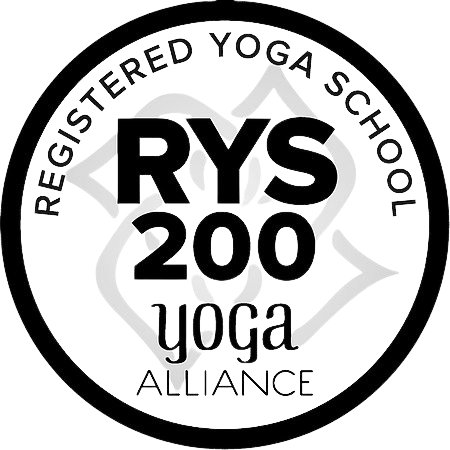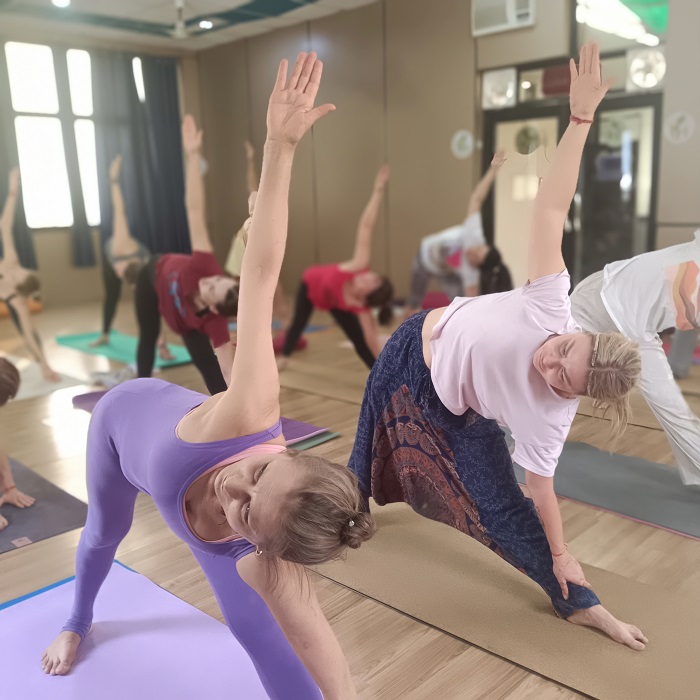

Located in the peaceful landscapes of Kerala, our renowned yoga school in Kerala offers a Yoga And Meditation Teacher Training. It provides a profound and life-enriching experience that is designed to promote your physical, mental as well as spiritual growth.
Our Yoga and Meditation Teacher Training in Kerala combines the ancient wisdom of yoga and meditation with modern teaching methodologies. Conducted by our experienced and certified yoga instructors, this comprehensive training equips you to become a skilled yoga and meditation teacher while deepening your personal practice.
Whether you're an experienced yoga practitioner or new to yoga and meditation, our Yoga and Meditation Certification Course in Kerala caters to all levels and provides a supportive environment where you can explore, learn, and evolve.
Rishikul Yogshala is a popular choice for those seeking Yoga And Meditation Teacher Training in Kerala, India. There are several reasons why one should consider our yoga school in Kerala for their Yoga And Meditation Certification Course:
Natural Beauty Kerala is often referred to as "God's Own Country" for its picturesque landscapes. The state boasts lush greenery, rolling hills, dense forests, serene backwaters, and pristine beaches. These natural elements create a peaceful and harmonious environment ideal for yoga and meditation practice. The beauty of Rishikul Yogshala in Kerala invites you to connect with nature on a profound level, making your spiritual journey even more meaningful.
Traditional Wisdom Kerala's cultural heritage is deeply intertwined with yoga and meditation. This region has been a hub for ancient wisdom and holistic practices for centuries. By choosing Rishikul Yogshala for your meditation teacher training, you have the unique opportunity to engage yourself in these authentic traditions. You can also learn from local experts who have inherited and preserved the teachings passed down through generations, providing a profound and culturally rich experience.
Experienced Instructors Our Yoga And Meditation Teacher Training Course in Kerala are led by highly experienced and certified yoga and meditation instructors. These teachers have dedicated themselves to a lifelong journey of learning and practicing these ancient disciplines. Their expertise and deep understanding of yoga and meditation ensure that you receive authentic and high-quality guidance during your training. They are not just instructors but also mentors on your spiritual path.
Holistic Learning Kerala's spiritual ambiance encourages a holistic approach to yoga and meditation. While physical postures (asanas) are an essential part of the practice, our Yoga And Meditation Training in Kerala goes beyond that. We emphasize meditation to calm the mind, explore the philosophy behind yoga, delve into human anatomy to understand the body's mechanics, and teach you the art of effective instruction. This well-rounded curriculum ensures that you receive a comprehensive education that prepares you to share the benefits of yoga and meditation with others.
Health and Well-being Yoga And Meditation practices are not only about physical postures and mental calmness but also about achieving holistic well-being. Through yoga and meditation, individuals can enhance their physical health by increasing flexibility, strength, and balance. Moreover, the deep relaxation and stress reduction techniques inherent in meditation promote mental and emotional well-being. The combination of these practices contributes to an overall sense of harmony, inner peace, and improved quality of life.
The eligibility criteria for our Yoga and Meditation Teacher Training in Kerala are as follows:
Age: Participants must be at least 18 years old at the time of enrollment to ensure a level of maturity and readiness for the program.
Educational Background: There are no specific educational prerequisites for our Yoga And Meditation Teacher Training in Kerala. It is open to individuals from all educational backgrounds.
Health and Physical Fitness: While a high level of physical fitness is not required, participants should be in good health and free from any medical conditions that may hinder their ability to engage in yoga and meditation practices. If you have any pre-existing health concerns, it is advisable to consult with a healthcare professional before enrolling.
Commitment and Dedication: Our Meditation TTC program at Rishikul Yogshala requires a strong commitment to learning and personal growth. Participants should be dedicated to attending all classes, completing assignments, and actively participating in the training.
Openness and Respect: A willingness to learn, respect for the teachings and traditions of yoga and meditation, and an open mind are essential attributes for successful participation in the Yoga And Meditation Certification Course in Kerala.
Language Proficiency: Our teacher training programs are conducted in English, so a reasonable proficiency in English is advisable to understand and actively participate in classes, discussions, and written assignments.
Passion for Yoga and Meditation: A genuine interest in yoga and meditation, as well as a desire to deepen your practice and potentially share these teachings with others, is highly encouraged.
Our Adjustment and Alignment Level 1 in Kerala is inclusive and welcomes yoga enthusiasts from diverse backgrounds and experience levels who share a common goal of deepening their knowledge of yoga adjustments and alignment.
So, embark on a transformative journey of self-discovery, inner peace, and the art of teaching yoga and meditation in the serene and spiritually rich landscapes of Kerala, India. Our comprehensive Yoga And Meditation Teacher Training in Kerala is designed to provide you with the knowledge, skills, and experiences to become a certified yoga and meditation instructor.
For inquiries, registration, and more information about our Yoga and Meditation Teacher Training in Kerala, please feel free to reach out to us through:
Website: https://www.rishikulyogshala.org
Email: info@rishikulyogshala.org
Phone: +91-8433225327 | +91-7017374621
Our dedicated team is here to assist you with any inquiries, provide guidance on the application process, and offer support throughout your transformative journey with Rishikul Yogshala. We look forward to welcoming you to our Yoga and Meditation Certification Course in Kerala!
"Embrace the journey within and become a beacon of mindfulness and serenity with Rishikul Yogshala's 200-Hour Meditation Teacher Certification. Unlock the secrets of inner peace, empower others with the gift of meditation, and watch the world transform, one breath at a time
Yoga Alliance is an international organization which supports Meditation Schools along with Meditation Teachers. Our school Rishikul Yogshala in Kerala is completely RYS 200 Yoga Alliance affiliated. When students complete their Meditation Teacher Training from our school, they become eligible to be Registered Meditation Teachers and can register with the Yoga Alliance for RYT 200 or RYT 500 as per their education. Once you are registered with the Yoga Alliance one will hire you without any doubt which will make your Meditation journey easy.
course fee
course fee
Our Meditation school venue is in The Kerala Retreat which is spread over many acres and is a very beautiful property which is attached to a gorgeous lake so that everyone can spend some quality time or can just walk around and admire the beauty of nature the location is just perfect surrounded with beautiful as well as enormous pine trees reflecting an exotic scenery soothing both the eyes and mind just by looking at it and also the location is between Kappil beach and Varkala beach making it easy for anyone to visit beaches if anyone wants to.
At Rishikul Yogshala Kerala, we are dedicated to providing an authentic and transformative meditation Teacher Training Course experience. To ensure the safety and well-being of our participants, we have established eligibility and health guidelines that all prospective students must adhere to. These guidelines have been designed to create a supportive and conducive environment for your meditation journey.
As you embark on the path of meditation with Rishikul Yogshala Kerala, remember that the journey within is as important as the destination. Our eligibility and health guidelines are not barriers, but rather pillars of support, ensuring your experience is enriching and transformative. Embrace this opportunity to dive deep into the ocean of self-awareness and inner peace."
Additionally, we prefer applicants who:
Total Evaluation For 200 Hour Meditation Teacher Training Course Ismentioned Below:
We provide certificates which are recognized worldwide as our 200 hour Meditation teacher Training is recognized by Yoga Alliance and once you completed the course you can register in Yoga Alliance as Registered Meditation Teacher(RYT), not only this certificate is recognized worldwide but it also gives you the recognition and makes you recognized worldwide and gives you infinite opportunities from getting a job anywhere in the world to starting your own Meditation studio anywhere around the globe.
100% Vegetarian food is provided which is a pure Yogic diet and good for health according to Ayurveda also.
If a student is Vegan or wants Gluten-free food, they can simply just ask the member of the staff for food changes according to their preferences. Every day one meal from the whole day meal will be rich in protein so that students can have the energy to do some hard energy-efficient Meditation asanas like Hatha, Ashtanga, etc.
"The Yoga And Meditation Certification Course in Kerala is well-organized. I have learned a lot in a short time. They explain yoga philosophy in a clear way so you can truly understand it. Thank You Rishikul Yogshala!"
United States
"The yoga teachers at Rishikul Yogshala are pros and have great techniques to help students with their asana practice. It gave me the confidence to teach yoga properly. I would highly recommend their Yoga And Meditation Teacher Training in Kerala!"
Spain
"Thank You, Rishikul Yogshala, for the unforgettable experience during the Yoga and Meditation Course in Kerala. I met many people there, and we shared lots of emotions. The location, meals, and accommodation were all remarkable!"
Spain
"I had a great time at Rishikul Yogshala during Yoga And Meditation Teacher Training in Kerala. The teachers treated us really well and were very professional. I'm so happy I got this opportunity."
USA
"The Yoga And Meditation Certification Course in Kerala is well-organized. I have learned a lot in a short time. They explain yoga philosophy in a clear way so you can truly understand it. Thank You Rishikul Yogshala!"
United States
"The yoga teachers at Rishikul Yogshala are pros and have great techniques to help students with their asana practice. It gave me the confidence to teach yoga properly. I would highly recommend their Yoga And Meditation Teacher Training in Kerala!"
Spain
"Thank You, Rishikul Yogshala, for the unforgettable experience during the Yoga and Meditation Course in Kerala. I met many people there, and we shared lots of emotions. The location, meals, and accommodation were all remarkable!"
Spain
"I had a great time at Rishikul Yogshala during Yoga And Meditation Teacher Training in Kerala. The teachers treated us really well and were very professional. I'm so happy I got this opportunity."
USA
"The Yoga And Meditation Certification Course in Kerala is well-organized. I have learned a lot in a short time. They explain yoga philosophy in a clear way so you can truly understand it. Thank You Rishikul Yogshala!"
United States
"The yoga teachers at Rishikul Yogshala are pros and have great techniques to help students with their asana practice. It gave me the confidence to teach yoga properly. I would highly recommend their Yoga And Meditation Teacher Training in Kerala!"
Spain
South Cliff Beach Resort, south cliff, near cafe sarwaa, Thiruvananthapuram, Varkala, Kerala 695141















